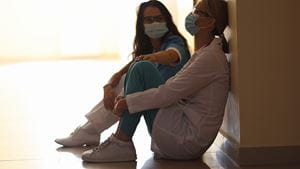
By 2030, approximately 13.6 percent of healthcare jobs in the United States are expected to be unfilled. In the Rochester area, that estimate grows to 18 percent.
Those unfilled jobs contribute to the stress levels of an already stressful industry.
Through the research in the recently released study A National Crisis: Mental Health Disorders and Workforce Shortages in the Healthcare Sector, Rochester Regional Health is looking at ways it can work toward developing strategies to empower its workforce.
In the study authored by three researchers, scientists assess how healthcare in the U.S. is trending toward a perfect storm.
Workforce shortages were already a challenge before the COVID-19 pandemic, and the pandemic made the situation worse. According to the study, some of the shortages “can be attributed to pandemic-induced causes, such as early retirement, burnout, and loss of life due to COVID-19, in addition to ongoing recruitment and retention challenges.”
Higher burnout rates are leading to a loss of people to fill positions on top of existing burnout. These shortages raise costs in a number of ways, and lead to not only fewer available options for people who need care, but reduces the quality of the care being provided. Nearly 1 in 4 healthcare workers report having PTSD; the economic and social cost of PTSD among healthcare workers is more than $7 billion in New York alone, according to the study.
For healthcare workers who are working through shortages and experiencing higher stress levels, they often develop mental health concerns as a result.
With all of these issues in mind, a comprehensive, multi-pronged strategy is needed to ensure the healthcare workforce remains resilient.
Pointing to the U.S. military as a successful example, the study highlights the importance of focusing a portion of the budget on retention and recruitment.
The U.S. Department of Defense reported nearly 456,300 servicemembers were diagnosed with mental health conditions between 2016 and 2020. Conditions included adjustment disorders, alcohol and substance-related disorders, PTSD, anxiety and bipolar disorders, and psychosis.
To help these men and women, the Department of Defense spent more than $44 million on mental health and suicide prevention programs in 2021. These programs match individuals with support through behavioral health clinics, medical treatment facilities, counseling programs, crisis lines, suicide prevention programs, and other forms of support.
Recruitment spending is another significant focus for the U.S. government when it comes to the military. In 2021 alone, nearly $1.9 billion was spent on recruiting commands, advertising, and processing active-duty military members.
If similar measures were implemented in the healthcare industry for recruitment and retention, the study suggests more than $2 billion would be needed to address mental health and recruiting efforts at the scale it is needed in New York alone.
In the conclusion of the report, researchers point to the strength of investing in the healthcare workforce at every level.
“In many ways, the vitality of the healthcare system is just as critical – it underpins the health and well-being of local communities, the economy, and national security,” the study authors said. “A similar commitment to funding programs and joint efforts from all stakeholders is required to restore the resiliency of the U.S. healthcare system.”
Leaders at Rochester Regional Health are taking action on the guidance offered in the study and building on its current efforts that make the wellness and health of its employees a priority.
Employees and volunteers have access to the Rochester Regional Health Wellness Centers at the Riedman Campus in Irondequoit and United Memorial Medical Center in Batavia. Wellness centers feature an array of fitness classes, gym equipment, personal training services, and modern facilities at no cost to employees and volunteers.
Other wellness initiatives include team members taking part in the GLOW Corporate Cup – a 5K team race to benefit the Genesee, Livingston, Orleans, and Wyoming (GLOW) YMCA – and the Couch to 5K training program.
To support the mental and emotional health of every team member, Rochester Regional Health therapists are a free resource for all employees. The Employee Assistance Program (EAP), which includes a range of services like crisis & stress counseling, legal advice, information on elder care, financial consultation, is free, confidential, and available every day at all hours.
For emotional and spiritual support, hospital chaplains are offered for staff as well as patients to provide a listening ear.
With these services and programs readily available for all Rochester Regional Health employees, administrators continue to look forward and explore new ways to support all team members as best as they are able.